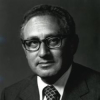Henry A. Kissinger

Henry A. Kissinger
Henry Alfred Kissingeris an American diplomat and political scientist. He served as National Security Advisor and later concurrently as United States Secretary of State in the administrations of presidents Richard Nixon and Gerald Ford. For his actions negotiating the ceasefire in Vietnam, Kissinger received the 1973 Nobel Peace Prize under controversial circumstances, with two members of the committee resigning in protest. Kissinger later sought, unsuccessfully, to return the prize. After his term, his advice has been sought by world leaders...
NationalityGerman
ProfessionStatesman
Date of Birth27 May 1923
CountryGermany
President Nixon in his inaugural address indicated that he wanted an era of negotiation. Our reasoning was that whatever our ideological differences, whatever our geopolitical differences, we were condemned to coexistence by nuclear weapons.
Realism in foreign policy is made up of a clear set of values, since difficult foreign policy decisions are often decided with the narrowest of majorities. Without any sense of what is right and wrong, one would drown in a flood of difficult and pragmatic decisions.
American politics are normally a result of pragmatic and not philosophical reasoning. No one in Washington has said we now prefer multilateralism.
The China of the 1970s was a communist dictatorship. The China of the twenty-first century is a one-party state without a firm ideological foundation, more similar to Mexico under the PRI than Russia under Stalin. But the measurement of the political and the economic evolution has not yet been completed, and is one of the weak points of the system.
When I first saw China, there were no automobiles. There were no supermarkets. There were no high-rise buildings. There were no consumer goods. There were no restaurants that were at least accessible that foreigners could see. It was a Stalinist society, and a very poor Stalinist society. So the economic system has totally changed, and the private sector in the economic system is now the dominant sector. It didn't exist at all as late as 1979.
What is applicable is to understand that first of all China has undergone a huge revolution in the last years. Anyone who saw China as I did in 1971 - and for that matter even in 1979, because not much had changed between 1971 and 1979 - and sees China today, knows one is in a different economic system.
I wouldn't say it's a split. It's a difference of emphasis. It does exist between, I would say, the State Department and the Defense Department.
Well, I don't know whether it caused anguish in China, but it was not a wise way to proceed. But one has to remember that it was the first experience. And in a Republican administration, there is a conservative wing that looks at China as the last embodiment of communism, which therefore tends towards a more bellicose rhetoric anyway than I would. It's not the dominant element, but every once in a while they get a crack at public statement.
Well, on the American side, every new administration has to cut its teeth in a crisis, because before a crisis, you don't really know what your various subordinates are thinking under stress.
I have been observing China for more than 30 years and am impressed how logically and wisely it tackles its problems. Obviously the international system could be unbalanced by China's rising power - if we don't prepare ourselves for the new competitive situation, that is. But it is an economic challenge, not aggression on the level of Hitler.
Access to natural resources can become a question of survival for many states.
In the period after the Second World War, there were still leaders in Europe who represented weak countries, but possessed a sense of global foreign policy. Nowadays, on the other hand, there are politicians who represent pretty powerful countries, but whose citizens are not prepared to sacrifice themselves for the state.
Accept everything about yourself - I mean everything, You are you and that is the beginning and the end - no apologies, no regrets.
Oil is much too important a commodity to be left in the hands of the Arabs.